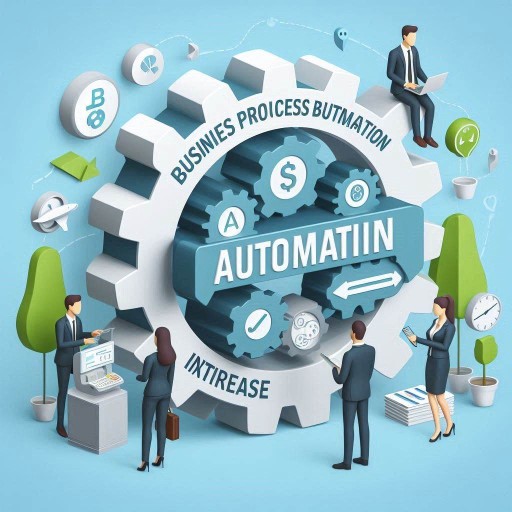TechTrend4u – Business process automation is one of the key components in digital transformation that can have a significant impact on a company’s operational efficiency. With technological advancements, automation allows businesses to reduce human errors, speed up processes, and ultimately increase productivity. This article will discuss what business process automation is, its benefits, as well as some examples of implementation in various industries.

What is Business Process Automation?
Business process automation (BPA) is the use of technology to execute repetitive and time-consuming business processes automatically, without or with little human intervention. It can involve different types of technology, ranging from simple software to manage administrative tasks to more complex systems such as Robotic Process Automation (RPA) and artificial intelligence (AI).
With automation, businesses can optimize workflows, reduce operational costs, and improve efficiency. Automation also allows companies to utilize human resources on more strategic and value-added tasks.
Read more: Digital Transformation: Building the Future of Business
Benefits of Business Process Automation
There are several key benefits that businesses can gain from process automation, including:
Operational Efficiency
Automation can speed up business processes that previously took a long time if done manually. For example, invoice or payroll processing that usually requires manual input can be completed in seconds with automation. This not only saves time but also increases productivity.
Reduces Human Error
Manual processes are prone to human error, especially in tasks that require precision, such as data entry. Automation can reduce or even eliminate these errors, ensuring that business processes run more smoothly and accurately.
Cost Savings
By reducing the time and resources needed to complete routine tasks, automation can result in significant cost savings. It can also help companies avoid costs associated with errors, such as the correction of incorrect data or fines for late deliveries.
Improving Customer Satisfaction
Automation allows companies to provide faster and more responsive services to customers. For example, automation in customer service can enable instant responses to questions or requests, increasing customer satisfaction and loyalty.
Scalability
Automation allows businesses to grow and expand without having to increase staff numbers proportionally. Automated systems can handle increased volumes of work more efficiently, allowing companies to scale more easily.
Read more: MSME Digitalization: Taking Small Businesses Global
Examples of Business Process Automation Implementation
Here are some examples of how business process automation has been implemented in various industries:
Automation in the Manufacturing Industry
The manufacturing industry is one of the sectors that utilize automation the most. In modern factories, robots and automated machines are used to perform various tasks, such as product assembly, packaging, and transportation of goods. With automation, companies can increase production output, reduce labor costs, and minimize production errors.
Example: Tesla uses automation in the production of their electric cars, with robots handling most of the assembly process, from fitting components to painting.
Automation in Customer Service
Many companies are now using chatbots and virtual assistants to handle customer queries and requests automatically. Chatbots can provide instant answers to common questions, direct customers to the right resources, or even process simple transactions.
Example: BCA Bank in Indonesia uses a chatbot called VIRA that can help customers perform various transactions, such as balance inquiry, fund transfer, and bill payment, through a messaging app.
Automation in the Financial Sector
In the financial sector, automation is used to process transactions, manage risk, and ensure regulatory compliance. Robotic Process Automation (RPA) is used to speed up insurance claims processing, transaction validation, and financial reporting.
Example: Allianz uses RPA to speed up the insurance claims process, enabling customers to get faster and more efficient service.
Automation in Human Resources (HR)
HR divisions in many companies are now using automation systems to handle employee recruitment, payroll, and performance management processes. Automation in recruitment, for example, allows companies to sift through thousands of applications in a short period of time, identifying the most suitable candidates based on certain criteria.
Example: Unilever uses AI and automation in its recruitment process to efficiently assess and screen candidates, reducing the time it takes to find top talent.
Automation in E-commerce
In the e-commerce sector, automation is used for various purposes, including inventory management, order fulfillment, and marketing. With automation, e-commerce companies can ensure that goods are always in stock, orders are shipped on time, and marketing campaigns are executed with the right targets.
Example: Amazon uses automation in their warehouses with robots that transport and pack products, speeding up the delivery process and improving operational efficiency.
Read more: E-commerce and Digital Marketing: Success in the Online World
Challenges in Business Process Automation Implementation
While there are many benefits offered by business process automation, there are also challenges that companies must face.
- High Initial Investment
Implementing automation, especially on a large scale, requires a significant initial investment in terms of software, hardware, and staff training. Companies must ensure that this investment will provide adequate ROI in the long run.
- Change Resistance
Staff may feel apprehensive about the impact of automation on their work, which may lead to resistance to change. It is important for management to provide clear education and communication about the benefits of automation as well as opportunities for new skill development.
- Technology Complexity
Automation technologies can be complex and require integration with existing systems. Companies need to ensure that they have the necessary resources and expertise to manage and maintain automation systems.
Read more: Technology Revolution in 2025
The Future of Business Process Automation
Along with the development of technology, business process automation will continue to evolve and provide new opportunities for companies to increase efficiency and innovation. Some future trends in business process automation include:
Artificial Intelligence (AI) Integration
AI will be increasingly used in automation to improve system intelligence and adaptability. AI can be used to analyze data in real-time, make predictions, and take automated decisions based on changing conditions.
Cloud-based Automation
With more and more companies turning to cloud solutions, cloud-based automation will become more common. This allows companies to access automation tools from anywhere, reducing the need for expensive on-premise infrastructure.
End-to-End Process Automation
In the future, we will see more companies implementing end-to-end automation, where the entire value chain, from suppliers to customers, is automated to create more seamless and efficient operations.
Read more: Artificial Intelligence: The Next Industrial Revolution?
Conclusion
Business process automation is a powerful tool to increase efficiency, reduce costs, and improve customer satisfaction. By understanding the benefits, challenges, and future trends of automation, companies can take the right steps to implement this technology and gain a competitive advantage in an increasingly digitized market.
Through the proper implementation of automation, businesses can optimize their operations, free up resources for innovation, and ultimately achieve greater success in the era of digital transformation.



